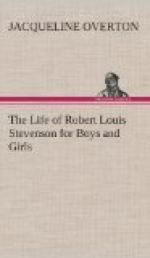[Illustration: Bas-relief of Stevenson by Augustus Saint Gaudens]
“I then asked Stevenson to pose but that was not successful ... all the gestures being forced and affected. Therefore I suggested to him that if he would try to write, some natural attitude might result. He assented and taking a sheet of paper ... he pulled his knees up and began. Immediately his attitude was such that I was enabled to create something of use and continued drawing while he wrote with an occasional smile. Presently I finished and told him there was no necessity for his writing any more. He did not reply but proceeded for quite a while. Then he folded the paper with deliberation, placed it in an envelope, addressed it, and handed it to me. It was to ‘Master Homer St. Gaudens.’
“I asked him: ‘Do you wish me to give this to the boy?’
“‘Yes,’
“‘When? Now?’
“‘Oh, no, in five or ten years, or when I am dead.’
“I put it in a safe and here it is:
“May 27, 1888.
“DEAR HOMER ST. GAUDENS—Your father
has brought you this day to see me and tells me it
is his hope you may remember the occasion. I am
going to do what I can to carry out his wish; and
it may amuse you, years after, to see this little
scrap of paper and to read what I write. I must
begin by testifying that you yourself took no interest
whatever in the introduction, and in the most proper
spirit displayed a single-minded ambition to get back
to play, and this I thought an excellent and admirable
point in your character. You were also,—I
use the past tense with a view to the time when you
shall read rather than to that when I am writing,—a
very pretty boy, and to my European views startlingly
self-possessed. My time of observation was so
limited that you must pardon me if I can say no more
... but you may perhaps like to know that the lean,
flushed man in bed, who interested you so little, was
in a state of mind extremely mingled and unpleasant;
harassed with work which he thought he was not doing
well, troubled with difficulties to which you will
in time succeed, and yet looking forward to no less
a matter than a voyage to the South Seas and the visitation
of savage and desert islands.
“Your
father’s friend,
“ROBERT
LOUIS STEVENSON.”
The portrait was finished in bas-relief and many copies were made of it. The most familiar is the one giving only Stevenson’s head and shoulders, but the splendid big one placed as a memorial to him in St. Giles’s Cathedral in Edinburgh shows him as he must have looked that day lying in bed, writing to Homer St. Gaudens.
Another man in New York whom Stevenson had admired for years and longed to meet was General Sherman. The war was long past, and he was then an old gentleman living very quietly. One day St. Gaudens took Stevenson to call on him, and he was asked afterward if he was at all disappointed in his hero.




